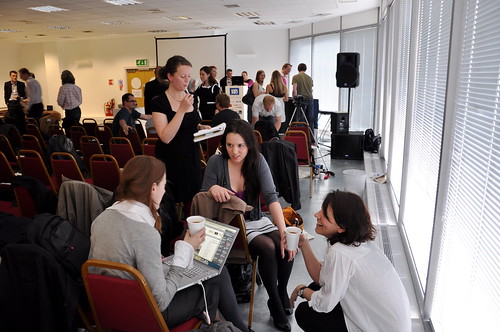We Are Social at #media140

Photo by Sizemore
Yesterday Robin and I attended media140 along with seemingly everyone I follow on Twitter (as Bash joked: “If you wanted to take out the hard core of London tech/media peeps, now would be your chance”). It was a good half-day of debate, case studies, and proving that Twitter people can interact in real life too. 🙂
Pat Kane gave a good keynote on how Twitter enriches more traditional journalism – creating a civic space of proto- or pro-am journalists supporting journalists in researching or reporting their stories. The G20 summit was one obvious example of this communal reporting – Kate Day’s blog post about that is well worth reading; what strikes me about these civic spaces is how ephemeral they are – the crowds that form around a news story are like flashmobs, there for the duration before dispersing. It brings into question who ‘owns’ a story and is the centre of this crowd given there is no permanent social structure in place.
Kevin Anderson talked about this social ‘glue’ and the help it gave him in his roadtrip during last year’s US elections, using Twitter not just to report but to meet people as well. Kevin mentioned how he felt disconnected his audience working for a big paper compared to working for a local one, and how using social media brought a lot of that back. Suw Charman-Anderson noted the differentiation within social media – in her Ada Lovelace Day project, she noted that people on Twitter were more open and more likely to help out than those who just pledged support on Facebook. It was an interesting insight into the differences between the two; in my mind, Twitter’s wider openness and realtime nature allows you to more fully experience the joy of meeting & conversing with random like-minded people. It allows you to join and adopt ephemeral crowds, and then take part in real-time and contribute as much or as little as you like, this fitting seamlessly into your everyday activity. Facebook’s mechanic of join and then ignore for groups is quite clunky and much less fine-grained in comparison, as well as being far less conversational (for more, in Robin’s recent eMarketer interview, he discusses the advantages of open social media over closed social networks).
These experiences reinforced in my mind how the key skill that anyone working in ‘traditional’ media should have with respect to Twitter or other social media: understanding and becoming part of the wider communities where your story might be discussed, creating or finding the transient virtual crowd that form around it, and then transforming that all the social capital and social content (tweets, links, ideas) into content that adds value for both you and them. Nick Halstead was keen to point out how all those 140-character Tweets can help you write up your brilliant 1000-word piece, but the perils of Twitter and unreliability of rumours can torpedo quality journalism if you get carried away. Bill Thompson was more embracing, describing the collective real-time stream of consciousness and how overwhelming it can be yet at the same time utterly enjoyable (a lovely contradiction).
Which leads onto my final thought: in a Twittered-up world, your media property is only as good as your audience, rather than your content. Mike Butcher talked about how social media allowed his audience to become his editors, which I think got misunderstood slightly by some other panellists – I don’t think Mike was saying he had abandoned all editorial control or responsibility, but with their ability to search, correct and feed back in real-time, he was directly responsible to them, and if he ever got things wrong, they would hold him to it. So getting an audience your content deserves becomes very important – and ultimately demands making sure you have skills and capabilities in community management as well as producing great content. The days of journalists relying on niche skills are truly over – and I wonder how quickly journalism and media courses are catching up?
Additionally, there’s some good summaries of media140 out there as well – Kevin Anderson covers the panel on news gathering and Pat Kane’s talk as well. Ewan Spence talks of the “impromptu community” that sprung up around Eurovision last weekend, exactly the kind of thing I was thinking of above, and quotes from Adam Tinworth (who also liveblogged the event): “Around an event like the Eurovision, the main broadcast is in real danger of becoming just a social object that people interact about elsewhere.” Danger makes it sound like a bad thing, whereas I’d argue the exact opposite.